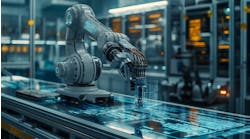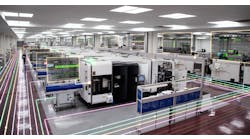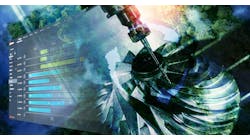Most machine shop operators don’t think of their organizations as “big”: they like to compete with the “big” manufacturers, and they may “dream big” about future plans and opportunities, but in their daily work their competitive advantage is in being small- and midsized enterprises, ready to work closely with customers, and able to adapt to changing market requirements.
But as for opportunities, machine shops have some adjustments to make. The big adjustment facing all businesses, including machine shops, is the Industrial Internet of Things (IoT, also referred to as Industry 4.0), and the factors forcing these adjustments are equally formidable.
So, what is IoT/Industry 4.0? It’s more than a concept and yet not quite a fact of life — but it is moving quickly in that direction. In terms of big ideas, there may be none bigger than IoT/Industry 4.0.
Fundamentally, it’s a network, but one that connects sub-networks, databases, information systems, production equipment, and objects: It draws information as necessary from these sources across these individual platforms into an interactive network that evaluates and communicates information to relevant sources and destinations.
IoT/Industry 4.0 seeks to advance and optimize the interaction between operations in a production supply chain. The integration of manufacturing, IT and cybersystems, including security is an expanding and evolving role in manufacturing — not least, at machine shops.
IoT/Industry 4.0 is developing at such a pace that machine shops — however small- midsized the enterprise may be — must take steps to understand and adjust to its effect on their business. There are apparent opportunities to be gained, regarding optimized performance or energy savings, or new business possibilities. There are also potential risks, in terms of capital, human and equipment resources, and enterprise security. So, how should machine shops proceed to engage IoT/Industry 4.0?
Many of the most critical functions of IoT/Industry 4.0 in manufacturing draw on functions already established by ERP/MES technologies, so we consulted with Terri Pruett Hiskey, vice president for Product Marketing, Manufacturing Portfolio at Epicor Software — one of the most prolific developers of ERP/MES for manufacturing businesses, including machine shops.
What is the primary benefit for a machine shop that adopts Internet of Things/Industry 4.0 functionality? Is it performance improvement? Or, competitive advantage?
“I think the answer to this is both. Machine shops that adopt IoT/Industry 4.0 technology can expect productivity improvements in instances where, currently, manual processes can be automated via sensors - such as tracking output or temperatures. This eliminates the need to have a person collect that information, and it also helps to prevent human errors that may be made in recording numbers and transferring them to a spreadsheet.”
But, Terri Pruett Hiskey pushed past the basic question to make a crucial distinction about machine shops’ practical benefits of the new technology:
“Machine shops that are first to adopt IoT/Industry 4.0 technology will be better positioned against their competitors with automated processes, and they will have better visibility into their output and equipment, so they can understand earlier in the process if a machine needs servicing because it isn’t producing as much output as usual,” she noted.
“This will enable machine shops to be more proactive about dealing with faulty equipment, and will let them get ahead of servicing such equipment before having to shut down production lines,” according to the Epicor expert.
How can machine shops or manufacturers get started collecting data via IoT in a standardized way?
“The ability to connect manufacturing equipment to a web-based network, and to derive substantial value from these connections is more practical and compelling than ever,” Hiskey contended. “Most machine tools communicate in standard Internet technology such as HTTP, TCP/IP, XML, and Ethernet, that are inherently network friendly.
“Well-developed standards such as MTConnect and OPC-UA facilitate the connection of machine tools and other manufacturing equipment to a data collection network, and enable interoperability required for plant-wide communication.
“The smallest machine shop can get started with small applications, such as sensors that report on temperatures or output connecting back to a central database so that trends can be analyzed over time. This is an area that companies can test the waters with small, targeted use cases—no need to boil the ocean.”
How can machine shops maintain security over data collected via IoT?
“Cyber threats to IoT-related processes are real and, according to security experts, are growing. Threats include theft of intellectual property (IP), alterations to data, and disruptions of processes. Shops will need to consider how to protect their data, systems and networks at every step,” Terry Pruett Hiskey acknowledged.
“Connecting machines tools to a network can create a number of vulnerabilities, so companies will have to be sure to consider and build in security protocols to minimize these threats as they implement their Smart factory.”
Is it necessary to invest in capital equipment or hardware to collect information via IoT, or can cloud technologies be leveraged?
“While adopters of IoT technology will need a central repository in which to store the data is collected, that repository doesn’t need to physically reside at the machine shop. In fact, many companies are opting for remote storage of their data via the cloud.
”This approach takes the responsibility of maintaining capital equipment off the organization,” Hiskey noted, “and the capacity of the cloud to store and process data is virtually unlimited. Storing and processing data remotely is generally more economical, flexible, and secure than on-site alternatives.
“The cloud is also more scalable, and its capacity can be expanded to rapidly meet growing demand,” she noted.
What are the software and network programming requirements for a machine shop adopting IoT/Industry 4.0?
“Most machine tools communicate in HTTP, TCP/IP, XML and Ethernet, so nothing too out of the ordinary,” Hiskey assured. “A bigger thing to consider is what kind of data should be collected?
“One of the advantages of the data collected via IoT is that the data enables better decision-making,” she explained. “When devices are connected, the data they generate can flow into software applications that create the information individuals need to make choices that are timely and effective. Decisions then can be made on knowledge and facts, not guesswork.
“Better decisions mean fewer mistakes and less waste,” she continued. “Details to consider and determine when setting up IoT processes are: What data to collect; who should receive this data; how the information will be used; and how this supports decision making.”
What are the personnel and training requirements for a machine shop adopting IoT/Industry 4.0?
“As much as IoT enables the automation of processes, there is no doubt that human beings will still play a large, engaging role at manufacturers. In fact, the human role will grow in importance and influence,” Hiskey replied, indicating that the requirements of people within an IoT-empowered organization are extension of the current requirements: design insight, programming skill, material and energy engineering, and financial management and strategic analysis.
“IoT will enable the collection, analysis, and management of data for devices and sensors throughout the manufacturing operation,” Hiskey noted, “but the most important sources and consumers of this data are people, including operators, programmers, maintenance engineers, production supervisors, and front-office business managers.”
What are the common or typical risks or mistakes faced by a machine shop adopting IoT/Industry 4.0?
“One of the biggest risks is IT security,” the Epicor expert reconfirmed. “Another risk, or potential mistake, is not defining specifically what data is the most helpful to a particular project, or determining a way to analyze the data that is being collected. These things should be considered from the start in order to have an effective IoT strategy.”
Do you recommend preliminary or incremental goals for a machine shop working to adopt Internet of Things/Industry 4.0 functionality?
“Yes. IoT projects can be implemented as small projects to start, with simple implementations of sensors collecting basic data around output, temperature or performance, where data can be collected, aggregated and analyzed easily.
“As the understanding of IoT grows, the projects can expand to become more complex,” she confirmed.
There is no denying the big potential for disruption to small- and mid-sized enterprises that IoT/Industry 4.0 represents. However, the growth opportunities are on a scale with that potential — and the evolution is to a new way of doing business is underway. Machine shops should recognize these developments, and learn what the new technology is informing them about their customers, their markets, and their businesses.






